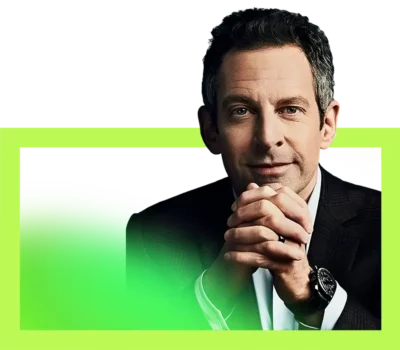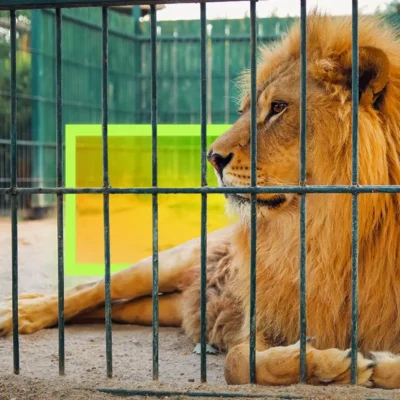ROHAN GUNATILLAKE: I’m delighted to introduce you to someone we admire tremendously: Sam Harris, bestselling author and creator of the Waking Up app, which I recommend you download from the App store. Sam’s practical, science-backed approach to mindfulness and meditation inspires so many on our team.
Today’s episode is something of an experiment for us. It is adapted from an interview with Sam about meditation by Belgian neuroscientist and neurologist Steven Laureys that Sam aired on his Making Sense podcast. Throughout their conversation, Sam talks with clarity about what meditation is, using his own experience to consider why we might do it, and how it can help us understand our minds.
To put the episode together, we edited Sam’s responses to Steven’s questions in a cohesive way, adding music to underscore and amplify the episode’s moments of beauty and poetry.
It’s such a gift to hear Sam describe the nature of reality, what it means to cut through delusional thinking, and – crucially – how our mindfulness practice can help us show up for the people in our lives in a more meaningful way. It’s a heady experience to follow Sam on this journey of curiosity and mastery. You’ll find it a bit more intellectual than our typical story. But it has such beauty and depth. And we hope you find this special episode as useful a tool for deepening your practice as we do.
The body relaxed. The body breathing. Your senses open. Your mind open. Meeting the world.
SAM HARRIS: When I was 13, my best friend died. When I was 17, my father died. When I was 18, my girlfriend had broken up with me in college in her freshman year. I had a very lucky life at that point, all things considered, but those experiences hit me really hard. I was really unhappy.
I was probably in some kind of clinical state of depression for several months after that. I was not myself. And it was because I was thinking incessantly about what I had lost. I was meditating on loss and loneliness and grief and had absolutely no insight into this process. I was just a mere puppet being blown around by whatever this next train of thought would be.
In my case, and this is really not unusual, my interest was first precipitated by a drug experience. It was MDMA, otherwise known as ecstasy. I think I was 18. I wasn’t at a rave or a party, it wasn’t really a recreational use of that drug. I took it very much in the spirit of investigating my mind and seeing what transformative experiences might be on the other side of my ordinary waking consciousness. The experience itself wasn’t so directly relevant to what I later came to consider the true purpose of meditation, but it revealed for me the fact that it was possible to have a very different experience of myself and the world and my sense of my being in the world. And it was possible to have a much better life than I was going to have by living out the implications of my own conditioning and tendencies at that point. So it set me on this path of self inquiry where I then explicitly studied techniques of meditation to try to explore the landscape of mind further, directly through introspection.
I had been given a book by Ram Dass, who originally was named Richard Albert. He along with Timothy Leary, led some of those initial experiments at Harvard in the 60s studying LSD, and was also fired from Harvard along with Tim Leary, for their misadventures in handing out LSD to all comers.
He went to India, he met his teacher. He came back in with a very long beard and in a dress, calling himself Ram Dass. This was ’87. I sat my first meditation retreat with him, and there, he was teaching an eclectic mix of practices. It was really kind of a buffet of spirituality, but part of it was Buddhist meditation, in particular Vipassana or mindfulness meditation. That was the practice I most connected with. I spent about two years on silent retreat in my 20s and had dropped out of school and wasn’t quite sure how I was going to integrate all of these things. And then only after that decade, did I return to school and get a PhD in neuroscience and begin to get all of my interests aligned, and it’s taken some time, but now I’m in a position to have the kinds of conversations I want to have about the nature of the mind and what can be understood about it – or not – based on first person methods like meditation.
I think it’s best understood by describing the usual starting point for the practice of meditation. So someone decides they want to meditate, and they’re taught a method, and this can be mindfulness, this can be some other method like transcendental meditation or your mantra meditation. Could be a visualization practice. It can be any use of their attention, but most of us start that project from a specific point of view. I mean, people tend to close their eyes, and if it’s ordinary mindfulness practice, they might be told to focus on the breath.
If you close your eyes, and you try to pay attention to your breath, most people will feel that their consciousness, their awareness is a kind of a locus of attention in the head. They’re paying attention from some place, and it’s very likely in their head behind their eyes, and they can aim their attention at the object of meditation. So if they’re aiming their attention at the breath, whether at the tip of the nose or in the rising and falling of their chest or abdomen, there’s the sense of being a subject in the head that can now strategically pay attention to something.
And of course, the real obstacle to doing this successfully is distraction. Getting lost in thought. And so thoughts are continually arising, and you’re getting pulled away from the object of meditation, and then you bring your attention back to the breath or to sounds, or to a visualization or a mantra, whatever you’re focusing on. As concentration builds, this can become more and more successful. Attention can rest on the object of meditation for longer periods of time. And if you’re practicing mindfulness, you can get good enough so that you can even notice thoughts arising as objects in consciousness, rather than just be merely taken away by them in each moment.
There are really two “whys,” which can be more or less important for people. I mean, the most common why though, the why that is certainly advocated by the Buddhist tradition, generally, isn’t really intellectual curiosity. It’s much more a matter of overcoming suffering. We all feel unhappy to one or another degree in our lives, and it’s not to say that happiness doesn’t come, but it also goes. You just can’t stay joyful all the time. And if you just wait long enough, you’ll feel frustrated and annoyed and angry and sad and fearful. There’s a lot of psychological pain that most of us experience fairly regularly, and meditation is offered as a method of having some fundamental insights into that process, such that you don’t keep suffering to the same degree and in all the ordinary ways.
It certainly holds out the promise that it might be possible in some sense not to suffer at all, to actually fully escape the logic by which you tend to make yourself miserable. And it has a lot to do with having insight into the nature of thought itself and breaking one’s identification with thought. So much of our psychological suffering is mediated by our thinking about the past and the future, and in failing to connect with the present, because we’re thinking so much and not noticing that we’re lost in thought. So my motivation was primarily about living a better life in the sense of just not suffering unnecessarily. I mean, just actually being happier at recovering from the ordinary collisions in life that caused psychological pain, recovering more quickly. And I think that certainly is the most common motivation. And for me, both of these motivations continue.
Most of us, most of the time have at best mediocre thoughts. We’re not tending to tell ourselves a story about how good life is, how grateful we are for all that we have, how beautiful the people in our lives are, and how lucky we are to be with them. I mean, you can decide to shape your thoughts along very deliberately wholesome lines that will improve your mood. That’s a totally useful practice that is very much supportive of mindfulness and these other practices we’re talking about, but most of us don’t tend to do that automatically.
We tend to be captured by a story of deficiency. Things are not yet good enough. We’re telling ourselves a story that if only we could change these things about our lives, if only I could get another girlfriend, right, if only I could meet somebody. If only I could get back to the girlfriend who broke up with me, that self-talk seems to promise something which proves to be a mirage. This idea that if we could only arrange our lives perfectly, there would be a good enough reason for attention to truly rest in the present moment and be satisfied. But unless you have a mind that is capable of that, that’s not what happens.
You get what you want and you find that you simply want other things at that point. Your happiness appears to be contingent upon satisfying those desires. I’m not saying it’s not better to get what you want than to have just one disappointment after the next. I mean, yes, they’re ordinary sources of pleasure and happiness in this life, but none of them are durable sources of happiness. All of these contingent sources of happiness need to be continually propped up by our efforts. They all tend to degrade.
You accomplish one goal, and no matter how wonderful an experience it is to do that, it doesn’t take 15 minutes before people are asking you, “What are you going to do next?” Nothing gets finely banked as the foundation upon which you can rest and be happy. So meditation is the practice of understanding something about the mechanics of this dissatisfaction and this search for happiness.
Again, it’s difficult to talk about, because it is somewhat paradoxical. I mean, this is the line one continually walks in describing meditation and its benefits because it’s not that nothing else matters. It’s not that there aren’t ordinary requisites for happiness that you want to recommend to people. Yes, it is good to have good relationships, being integrated in a community and having people you love and who love you, who can support you, and who you in turn support. All of that is for most people, most of the time, a necessary component of being a happy person.
And yet there is an illusion here, it’s not stable. And all of that is made better by discovering that the true foundation for psychological wellbeing doesn’t rest on even those relationships. To have the best relationship, to have the best marriage, on some level you really need to already be happy. You need to bring into that relationship, not your need for companionship, but your ability to simply love the other person. It’s not transactional. It’s not, I’ll love you, if you love me. It’s: you’re already happy, and you deeply want happiness for this other person. You’re not extracting something from them for your own benefit. Though, you are getting a lot of benefit by being with them.
Relationships get healthier and healthier the more you on some level can be just as happy when you’re alone in a room. And when the one you love leaves the room, you’re not diminished by that.
There are no guarantees that you’re going to live a long life. And so it’s something that I’ve always kept in front of me as a fact. Meditation is a further way of doing that. It’s a method of recognizing just how much there is to be grateful for, you haven’t died yet. Your life is right here to be enjoyed, and it can only be enjoyed by you.
Without an awareness of death, I think it would be possible to just distract yourself as pleasantly as you could muster always. And have kind of no deeper priorities. There really is something good about being aware of death, but unless you can find that and use that, it is easy to just feel like it’s a source of unhappiness. I mean, every time you think about death, you feel like, “Okay, that’s no place to linger.” And the project now is to forget about it. And I think that’s a misuse of the actual opportunity.
I mean, this corner of the universe that is illuminated where you sit, only you get to make the most of that and how you pay attention to it, it really is the most important piece of that. Making the most of it isn’t in the end radically changing what is already the case there. It’s really being able to sink into the experience of being in the world more and more, and enjoy it, and enjoy it in relationship to other people. Enjoy it in relationship to the natural beauty of the world, enjoy it by behaving more and more ethically. Enjoy it by having better and better intentions with respect to your collaboration with other people, and enjoying the quality of mind, born of those good intentions. Rather than seeing yourself in competition with others, actually wanting other people to succeed and feeling good when they succeed, rather than feeling like your happiness has been somehow diminished by someone getting a slice of the pie that you wanted.
Using all of that to come to rest more and more in the present moment, I really do see that as the project.







